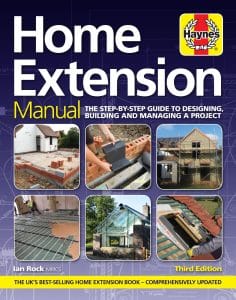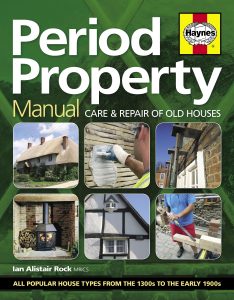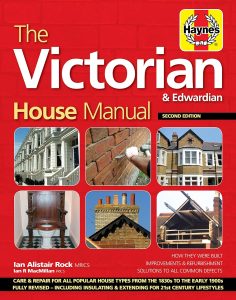Property Tips by Chartered Surveyor Ian Rock FRICS – from the Haynes House Manual series
What should you do if your surveyor finds illegal building work?
One of the most common issues that comes up in survey reports is the question of whether Planning Permission and/or Building Regulations consent were obtained for things like home extensions, loft conversions and structural alterations.
Your surveyor will normally flag up any works likely to have needed consent but it’s the job of your legal adviser / conveyancer to check this.
So it’s a good idea to notify your legal team with at a copy of your survey report listing the specific items that need to be verified.
Because this is often left until quite late in the purchase process it can come as quite a shock to learn that works were carried out without the necessary consents and are therefore illegal. The planning authorities have the power to enforce demolition for illegal works, so the vendors should be asked to obtain a Certificate of Legal Use (a.k.a. Lawful Development Certificate) to ensure that the new owners will not be subjected to any enforcement action.
Where Building Regulations compliance cannot be proven it raises questions about the quality of building work where the construction process wasn’t professionally checked.
Since these sorts of concerns often arise as you’re getting close to exchange of contracts, they have the potential to be a deal-breaker. So it’s important to ensure that cool heads prevail.
Possible solutions include:-
* Asking the sellers as early as possible whether written approval was granted for any extensions or structural works. Where small extensions qualified as ‘permitted development’ without the need for planning consent, a Building Regulations completion certificate is still required.
* Instructing a survey and ask the surveyor to comment on the quality of workmanship, and point out any defects or inadequacies. Hidden things like foundation depths can only be checked if you pay to have trial holes dug.
* Saving time by aranging an indemnity insurance policy. These are designed to compensate you if retrospective consent is not forthcoming. Compensation actually covers you against action by the local Building Consent Department for breach of building regulations. It does not cover or guarantee the quality of the work. So such policies don’t actually solve the problem, but they can be a handy ‘sticking plaster’.
Certificate of regularisation
Problems can also arise if your mortgage lender is only willing to release funding on the condition that you apply for a ‘certificate of regularisation’.
This involves Building Control retrospectively inspecting the property once the work in question has been ‘opened up’ (usually by builders) so that it’s clearly visible.
There are three possible outcomes: approval, where the work complies; rectification, where it doesn’t comply; or re-instatement, putting it back to it’s original state where it isn’t possible to rectify things.
Self certification
A Building Regs completion certificate is what you want to see for building work such as extensions, loft conversions, and garage conversions, and also for structural alterations like taking down internal walls (where they are load-bearing, ie supporting floors, roofs or walls above) or removing chimney breasts etc.
But approval of works such as electrical wiring, replacement windows, heating installations is normally delegated via approved installers registered as ‘competent persons’ who can certify that work has been carried out in compliance with the Building Regs. Certain trade bodies are allowed to ‘self-certify’ their members’ work and issue completion certificates:-
- FENSA – Replacement windows should be installed by a company registered with Fenestration Self Assessment (FENSA) who will be able to self-certify the compliance of the works (not required where only the glass is being replaced).
- CERTASS – Contractors registered with CERTASS (which stands for ‘Certification and Assessment’) can self-certify that their replacement window installations adhere to current Building Regulations– as an alternative to FENSA.
- GAS SAFE – Gas Safe registered contractors can issue certificates for installations and alterations to gas, hot water and heating systems. But the contractor must be a registered member, not just a service engineer.
- OFTEC – the equivalent of Gas Safe for oil fired boilers and appliances
- HETAS – the equivalent of Gas Safe for solid fuel burning boilers and appliances
- Electrical Contractors – must be registered under one of the ‘Part P’ schemes in order to issue certificates for domestic electrical work and belong to an accredited scheme operator such as NICEIC or NAPIT
See Rightsurvey.co.uk for a quick guide to survey prices
Check out our other posts for more info that will help you pay the right price for the right property.
We would always recommend using RICS certified surveyors in every instance – don’t get caught out, get instant quotes for RICS surveyors here.
Ian Rock’s Rightsurvey property tips are taken from the Haynes House Manual series.







